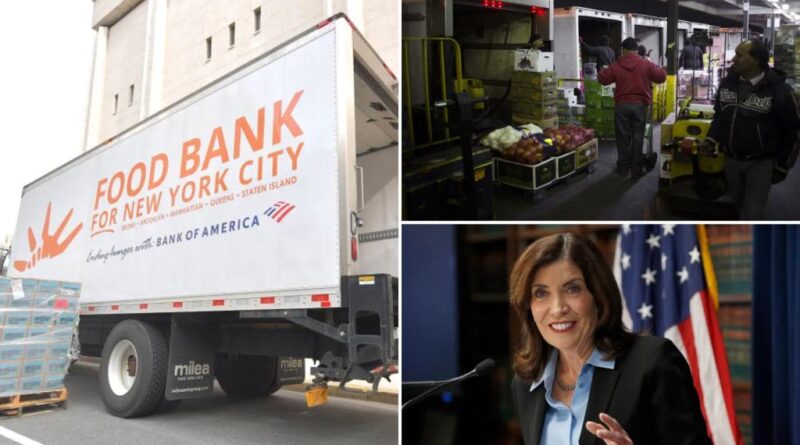Congestion Pricing Could Significantly Impact NYC’s Food Supply Chain

We represent the Food Bank For NYC, the NYC Hospitality Alliance, and Baldor Specialty Foods, all crucial elements of the city’s food supply chain — a system that feeds millions of New Yorkers daily, whether they are dining at a local eatery, shopping at a supermarket or bodega, or seeking food assistance.
While we support the city’s objectives to curb traffic congestion, enhance air quality, and finance public transport, we have serious concerns that the congestion pricing policy, set to be implemented on January 5, 2025, unfairly impacts vital food distributors, restaurants, and hunger relief organizations.
Delivering and serving food in one of the world’s most logistically challenging and costly cities is already difficult.
With congestion pricing, our operational costs are set to rise even further.
This is why we are advocating for an exemption for local food and beverage distributors prior to the implementation of this policy. Food distribution needs to be recognized as an essential service.
New York’s celebrated food culture is significantly dependent on its local food distribution network.
Restaurants, grocery stores, hospitals, schools, and food pantries throughout Manhattan rely on truck deliveries to remain operational and fulfill their customers’ needs.
We cannot rely on public transportation for delivering essential items — be it fresh fruits, vegetables, meat, fish, or dairy, whether sourced from Hunts Point markets in The Bronx, various local wholesalers and producers in other boroughs, or food assistance organizations.
The existing congestion pricing plan overlooks this fundamental reality.
Local businesses already contribute significantly to the city’s transportation framework through the Metropolitan Commuter Transportation Mobility Tax (MCTMT).
However, the new congestion pricing policy would impose an additional financial burden on local food distributors and the businesses they supply, including nonprofits and the communities they serve.
While larger firms like Baldor may attempt to absorb these costs within their operating expenses, not all distribution companies have that capacity.
This means costs will invariably be transferred down the food supply chain to consumers, resulting in increased prices.
The food distribution network supports not only large enterprises but also countless small, locally-owned restaurants, cafés, bodegas, and food retailers that give New York City its distinct character.
Many of these small businesses are already struggling with high costs resulting from inflation, soaring commercial rents, taxes, and stringent regulations.
The advent of congestion pricing would represent yet another setback, inflating the cost of goods they procure, rendering New York even more costly to operate.
As New Yorkers deal with high food prices, the introduction of additional charges will only exacerbate the situation.
Small businesses operating on narrow profit margins will have no alternative but to pass these costs onto consumers, who are already voicing concerns about the expense of dining and grocery shopping.
This will disproportionately affect low-income families, making food even less accessible for those already beleaguered by rising living costs.
Efforts to support small businesses and cultivate a fairer food system will be compromised.
Moreover, congestion pricing poses a threat to New York City’s public health initiatives, particularly in addressing chronic and diet-related diseases.
New York has long been at the forefront of encouraging healthier eating and diminishing health disparities, but surging food prices could counteract those efforts.
For many New Yorkers, particularly in low-income neighborhoods, accessing affordable and nutritious food is already a battle. Increased prices or diminished healthy food options would disproportionately impact those most susceptible to chronic ailments such as heart disease, diabetes, and stroke.
We recognize the importance of maintaining a stable food supply for at-risk populations.
Food banks and the pantries they support serve as the last resort for individuals confronted with food insecurity.
If food prices increase or availability diminishes because of congestion pricing, it will further burden Food Bank For NYC’s capacity to assist the city’s most vulnerable residents.
We are confident that Gov. Hochul and New York’s leaders recognize the significance of our food distribution framework, food relief organizations, and local businesses.
Thus, we urge you not to finance one essential service — public transportation — at the expense of another equally crucial one, food distribution.
The solution is evident: New York must grant an exemption for local food and beverage distributors from congestion pricing fees.
We should not be penalized for sustaining the city’s food system.
Leslie Gordon is the President & CEO of Food Bank For NYC. Seth Gottlieb is the SVP, Logistics, for Baldor Specialty Foods. Andrew Rigie is the Executive Director of NYC Hospitality Alliance.



